REDUCING OBESITY IN CHILDREN THROUGH SCHOOL-BASED INTERVENTIONS1.
Added on 2023-01-06
40 Pages11332 Words24 Views
Running head: REDUCING OBESITY IN CHILDREN THROUGH SCHOOL-BASED INTERVENTIONS1
Effectiveness of School-based Interventions in Reducing Obesity among School Children
Name
Institutional Affiliation
Effectiveness of School-based Interventions in Reducing Obesity among School Children
Name
Institutional Affiliation

REDUCING OBESITY IN CHILDREN THROUGH SCHOOL-BASED INTERVENTIONS 2
Abstract
Currently, the world has undergone not only a rapid nutritional transformation but also a rapid
epidemiological evolution characterized by unrelenting deficiencies associated with nutrition. In
efforts to reduce the impacts of obesity, schools provide an exclusive environment to support
children and young people in developing their mental health. The schools-based intervention
programs help children in managing different health concerns that aid in reducing obesity issues.
The children and young people spend their most time at school. Thus, school based interventions
are necessary to reduce medical consequences since childhood obesity is considered to be
associated with medical conditions namely sleep apnea, asthma, cardiovascular disease, hepatic
steatosis, and impaired balance. However, most of the listed health conditions were majorly
found in adults but today some of them are prevalent in children with obesity though they are
preventable and at adolescent stage some can disappear. In recommendation, curriculum on
physical activities, body images as well as healthy eating should be integrated into regular
academic curriculum to ensure that children learn as well as practice healthy eating, get involved
in physical activities and learn to appreciate their body without being dissatisfied with their body
image. There should be more physical activity sessions, fundamental developmental of
movement skills throughout the week in school to ensure that children get appropriate and
enough time to keep being physically fit thereby reducing risks of overweight which ultimately
results to obesity
Keywords: Obesity, school-base, Interventions, children,
Abstract
Currently, the world has undergone not only a rapid nutritional transformation but also a rapid
epidemiological evolution characterized by unrelenting deficiencies associated with nutrition. In
efforts to reduce the impacts of obesity, schools provide an exclusive environment to support
children and young people in developing their mental health. The schools-based intervention
programs help children in managing different health concerns that aid in reducing obesity issues.
The children and young people spend their most time at school. Thus, school based interventions
are necessary to reduce medical consequences since childhood obesity is considered to be
associated with medical conditions namely sleep apnea, asthma, cardiovascular disease, hepatic
steatosis, and impaired balance. However, most of the listed health conditions were majorly
found in adults but today some of them are prevalent in children with obesity though they are
preventable and at adolescent stage some can disappear. In recommendation, curriculum on
physical activities, body images as well as healthy eating should be integrated into regular
academic curriculum to ensure that children learn as well as practice healthy eating, get involved
in physical activities and learn to appreciate their body without being dissatisfied with their body
image. There should be more physical activity sessions, fundamental developmental of
movement skills throughout the week in school to ensure that children get appropriate and
enough time to keep being physically fit thereby reducing risks of overweight which ultimately
results to obesity
Keywords: Obesity, school-base, Interventions, children,
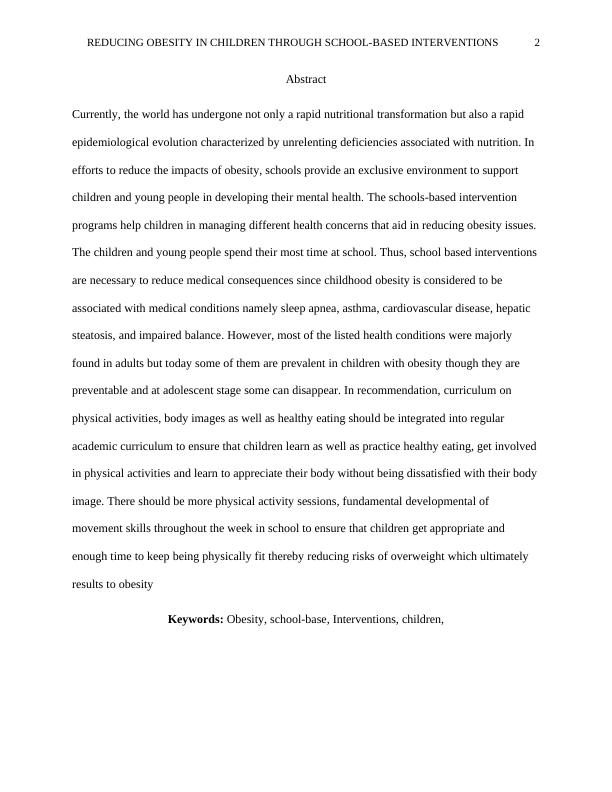
REDUCING OBESITY IN CHILDREN THROUGH SCHOOL-BASED INTERVENTIONS 3
Table of Contents
Abstract 2
Chapter 1: Introduction 4
1.1 Introduction 4
1.2 Research Aims and Objectives 6
1.3 Research Questions 7
1.4 Research Rationale 7
Chapter 2: Background 8
3.1 Introduction 8
3.2 Causes of Obesity 9
3.2.1 Sedentary Lifestyle10
3.2.2 Environmental Factors 11
3.2.3 Family and Socio-cultural Factors 11
3.2.4 Dietary Factors 11
3.2.5 Psychological Factors 13
3.3 Impacts of Obesity 13
3.4 Types of Interventions of Reducing obesity in Children 15
3.4.1 Community and Government Efforts 15
3.4.2 Family Based Interventions 16
3.4.3 School-based Interventions 17
Chapter 3: Research Methodology 19
2.1 Introduction 19
2.2 Search Strategy 19
3.3 Research Method-Qualitative Literature Review 19
2.4 Literature Review Approach 19
2.5 Study Selection, Exclusion and Inclusion Criteria 20
2.6 Data Extraction 20
2.7 Research Limitation 20
Chapter 4:Systematic Review Results 21
4.1 Introduction 21
4.2 School-based Intervention Results 22
4.3 Effectiveness of School-based Interventions 23
Chapter 5: Systematic Review Discussion 26
Chapter 6: Implication, Conclusions and Recommendation 21
6.1 Implication 43
6.2 Conclusion 43
6.3 Recommendation 31
Table of Contents
Abstract 2
Chapter 1: Introduction 4
1.1 Introduction 4
1.2 Research Aims and Objectives 6
1.3 Research Questions 7
1.4 Research Rationale 7
Chapter 2: Background 8
3.1 Introduction 8
3.2 Causes of Obesity 9
3.2.1 Sedentary Lifestyle10
3.2.2 Environmental Factors 11
3.2.3 Family and Socio-cultural Factors 11
3.2.4 Dietary Factors 11
3.2.5 Psychological Factors 13
3.3 Impacts of Obesity 13
3.4 Types of Interventions of Reducing obesity in Children 15
3.4.1 Community and Government Efforts 15
3.4.2 Family Based Interventions 16
3.4.3 School-based Interventions 17
Chapter 3: Research Methodology 19
2.1 Introduction 19
2.2 Search Strategy 19
3.3 Research Method-Qualitative Literature Review 19
2.4 Literature Review Approach 19
2.5 Study Selection, Exclusion and Inclusion Criteria 20
2.6 Data Extraction 20
2.7 Research Limitation 20
Chapter 4:Systematic Review Results 21
4.1 Introduction 21
4.2 School-based Intervention Results 22
4.3 Effectiveness of School-based Interventions 23
Chapter 5: Systematic Review Discussion 26
Chapter 6: Implication, Conclusions and Recommendation 21
6.1 Implication 43
6.2 Conclusion 43
6.3 Recommendation 31
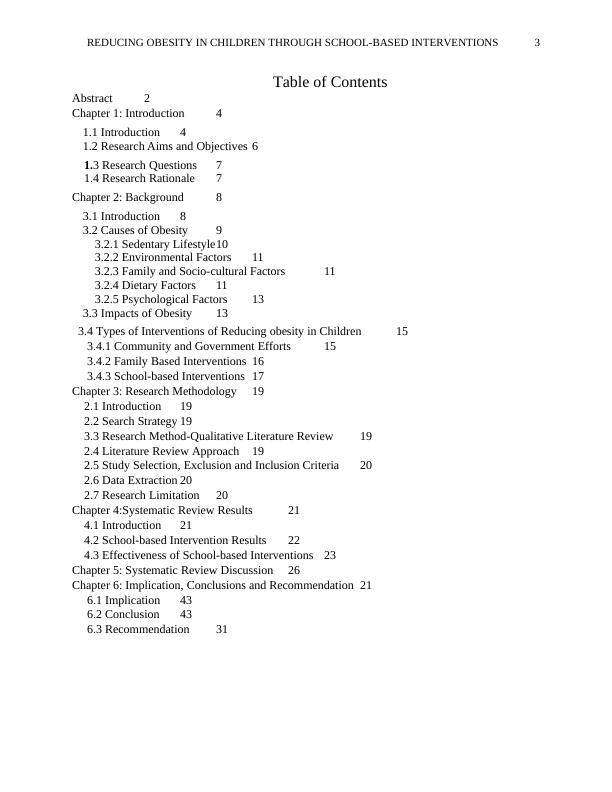
REDUCING OBESITY IN CHILDREN THROUGH SCHOOL-BASED INTERVENTIONS 4
CHAPTER ONE: INTRODUCTION
1.1 Introduction
Schools provide an exclusive environment to support children and young people in
developing their mental health. Besides, supporting the children for effective treatment of the
existing issues and preventing the problems with mental health is crucial. The schools-based
intervention programs help children in managing different health concerns such as physical
development and reducing obesity issues (Bleich et al., 2013). The children and young people
spend their most time at school; so school-based intervention programs play an essential role in
health development (Amini, Djazayery, Majdzadeh, Taghdisi, & Jazayeri, 2015). The time spent
in schools does not only impact to cognitive and academic progress but also impact on social
integration, physical development and knowledge about the health nutrients to reduce obesity
(Hung et al., 2015).
In schools, children remain in a unique environment where they can understand the
symptom of depression and ways to overcome depression from their life (Balle &Tortella, 2010).
The major barriers and challenges in school base intervention programs are time allotment, lack
of discipline practices and existing resources. These barriers are influencing the school based
interventions programmes’ effectiveness. In addition, there is lack of discipline in the learning
practices regarding the obesity and other healthcare issues, which is influencing the results of the
school base intervention programs (SobolGoldberg, Rabinowitz, & Gross, 2013). Due to lack of
appropriate resources, the schools are getting several issues in improving the knowledge of the
children in proper manner (Dobbins et al., 2013).
Obesity in childhood increases of cardiovascular diseases, as well as osteoarthritis risks,
different types of cancers and obesity in adulthood. The studies indicated that 17% children aged
CHAPTER ONE: INTRODUCTION
1.1 Introduction
Schools provide an exclusive environment to support children and young people in
developing their mental health. Besides, supporting the children for effective treatment of the
existing issues and preventing the problems with mental health is crucial. The schools-based
intervention programs help children in managing different health concerns such as physical
development and reducing obesity issues (Bleich et al., 2013). The children and young people
spend their most time at school; so school-based intervention programs play an essential role in
health development (Amini, Djazayery, Majdzadeh, Taghdisi, & Jazayeri, 2015). The time spent
in schools does not only impact to cognitive and academic progress but also impact on social
integration, physical development and knowledge about the health nutrients to reduce obesity
(Hung et al., 2015).
In schools, children remain in a unique environment where they can understand the
symptom of depression and ways to overcome depression from their life (Balle &Tortella, 2010).
The major barriers and challenges in school base intervention programs are time allotment, lack
of discipline practices and existing resources. These barriers are influencing the school based
interventions programmes’ effectiveness. In addition, there is lack of discipline in the learning
practices regarding the obesity and other healthcare issues, which is influencing the results of the
school base intervention programs (SobolGoldberg, Rabinowitz, & Gross, 2013). Due to lack of
appropriate resources, the schools are getting several issues in improving the knowledge of the
children in proper manner (Dobbins et al., 2013).
Obesity in childhood increases of cardiovascular diseases, as well as osteoarthritis risks,
different types of cancers and obesity in adulthood. The studies indicated that 17% children aged
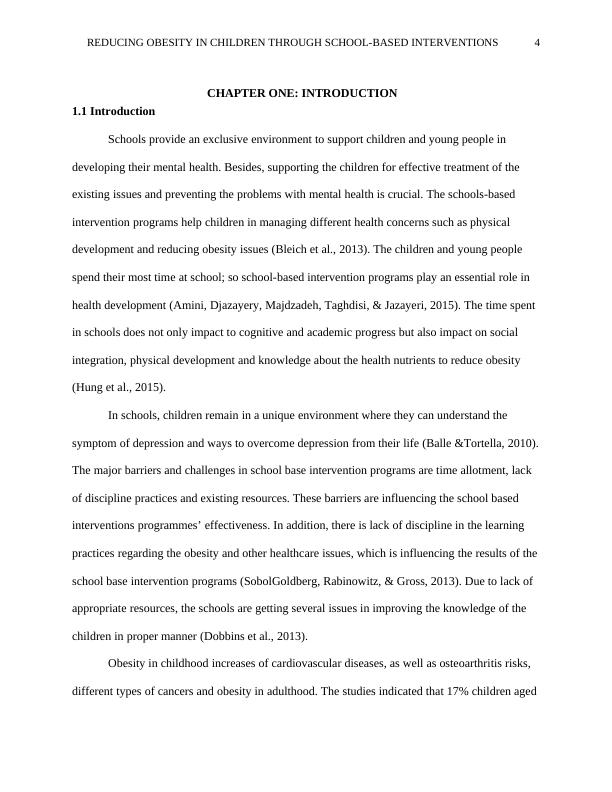
REDUCING OBESITY IN CHILDREN THROUGH SCHOOL-BASED INTERVENTIONS 5
between 2-19 years are facing the issue of overweight and 10-35% occurrence of obesity as well
as overweight is found in the children of European nations (Verjans et al., 2018). The issue of
overweight and obesity has adverse health outcomes that are insulin resistance, early progression
of atherosclerosis and cardiovascular diseases that can lead to premature death (Guerra et al.,
2013).
The schools are implementing an avenue for effective intervention directing childhood
obesity. Some of the countries such as UK and USA have approved legislation and guidelines to
implement the school-based intervention for better development of the children, both in mental
and physical perspectives (Mahmood, et al., 2014). From 1980s, the prevalence of obesity in
children is increasing rapidly. Different national and international efforts have need made to
reduce this health concern among the children and adults. There were 23.8% boys and 22.6%
girls with occurrence of obesity or overweight in the developed countries. The major causes of
obesity in children are low level of physical activities, unhealthy eating behaviour and sedentary
lifestyle (Verjans et al, 2018; Mahmood, et al., 2014).
Furthermore, as medical consequences; childhood obesity is considered to be linked to
medical illness namely menstrual abnormalities, sleep apnea, asthma, cardiovascular disease,
hepatic steatosis, impaired balance, skin conditions, Type 2 diabetes, gallstones, and orthopedic
problems. However, most of the listed health conditions were majorly found in adults but today
some of them are prevalent in children with obesity though they are preventable and at
adolescent stage some can disappear (Arnold et al., 2015). However, health problems linked to
childhood obesity like sleep apnea, cardiovascular disease, and diabetes can have negative
impacts on the life a child throughout adulthood with some instances even leading to death.
between 2-19 years are facing the issue of overweight and 10-35% occurrence of obesity as well
as overweight is found in the children of European nations (Verjans et al., 2018). The issue of
overweight and obesity has adverse health outcomes that are insulin resistance, early progression
of atherosclerosis and cardiovascular diseases that can lead to premature death (Guerra et al.,
2013).
The schools are implementing an avenue for effective intervention directing childhood
obesity. Some of the countries such as UK and USA have approved legislation and guidelines to
implement the school-based intervention for better development of the children, both in mental
and physical perspectives (Mahmood, et al., 2014). From 1980s, the prevalence of obesity in
children is increasing rapidly. Different national and international efforts have need made to
reduce this health concern among the children and adults. There were 23.8% boys and 22.6%
girls with occurrence of obesity or overweight in the developed countries. The major causes of
obesity in children are low level of physical activities, unhealthy eating behaviour and sedentary
lifestyle (Verjans et al, 2018; Mahmood, et al., 2014).
Furthermore, as medical consequences; childhood obesity is considered to be linked to
medical illness namely menstrual abnormalities, sleep apnea, asthma, cardiovascular disease,
hepatic steatosis, impaired balance, skin conditions, Type 2 diabetes, gallstones, and orthopedic
problems. However, most of the listed health conditions were majorly found in adults but today
some of them are prevalent in children with obesity though they are preventable and at
adolescent stage some can disappear (Arnold et al., 2015). However, health problems linked to
childhood obesity like sleep apnea, cardiovascular disease, and diabetes can have negative
impacts on the life a child throughout adulthood with some instances even leading to death.
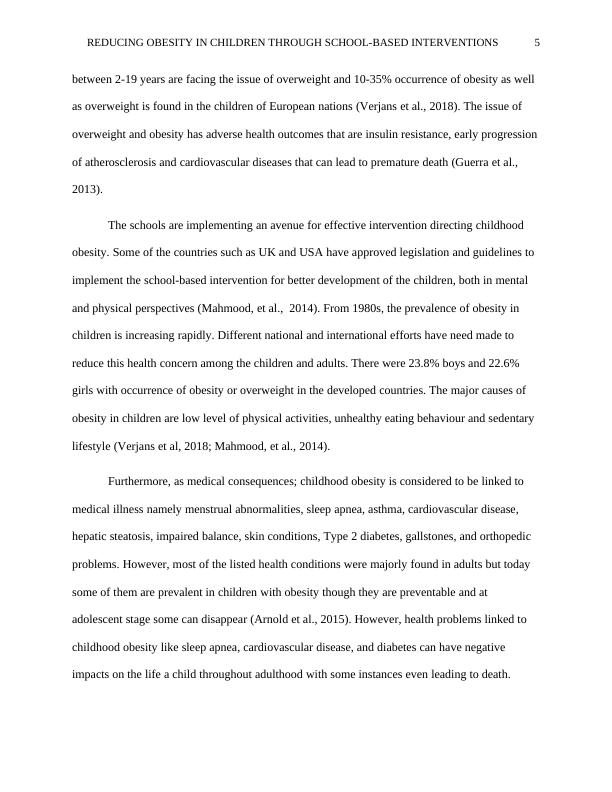
REDUCING OBESITY IN CHILDREN THROUGH SCHOOL-BASED INTERVENTIONS 6
1.2 Research Aims and Objectives
The major objective of the study was to provide an in-depth literature analysis of
school-based interventions effectiveness particular in reducing obesity among children. The aim
is attained by addressing the specific objectives as highlighted.
To investigate the existing school-based intervention programs and their roles in physical
development to reduce obesity in children.
To evaluate the school-based intervention programs efficacy especially reducing the
obesity among children
To explore the barriers and challenges in implementing school-based intervention
programs.
To suggest the ways to improve effectiveness of the school-based intervention programs
in obesity reduction in children.
1.3 Research Questions
For purposes of ensuring that the objectives of the highlighted research objective are met
effectively, a number of research questions were identified and formulated as follows:
What are existing school-based interventions?
What are the roles of school-based intervention is helpful physical and mental
development of children, focusing on obesity reduction?
How do parents involve in school-based intervention programs?
What is the efficacy of school-based intervention programs in reducing obesity among
children?
1.2 Research Aims and Objectives
The major objective of the study was to provide an in-depth literature analysis of
school-based interventions effectiveness particular in reducing obesity among children. The aim
is attained by addressing the specific objectives as highlighted.
To investigate the existing school-based intervention programs and their roles in physical
development to reduce obesity in children.
To evaluate the school-based intervention programs efficacy especially reducing the
obesity among children
To explore the barriers and challenges in implementing school-based intervention
programs.
To suggest the ways to improve effectiveness of the school-based intervention programs
in obesity reduction in children.
1.3 Research Questions
For purposes of ensuring that the objectives of the highlighted research objective are met
effectively, a number of research questions were identified and formulated as follows:
What are existing school-based interventions?
What are the roles of school-based intervention is helpful physical and mental
development of children, focusing on obesity reduction?
How do parents involve in school-based intervention programs?
What is the efficacy of school-based intervention programs in reducing obesity among
children?
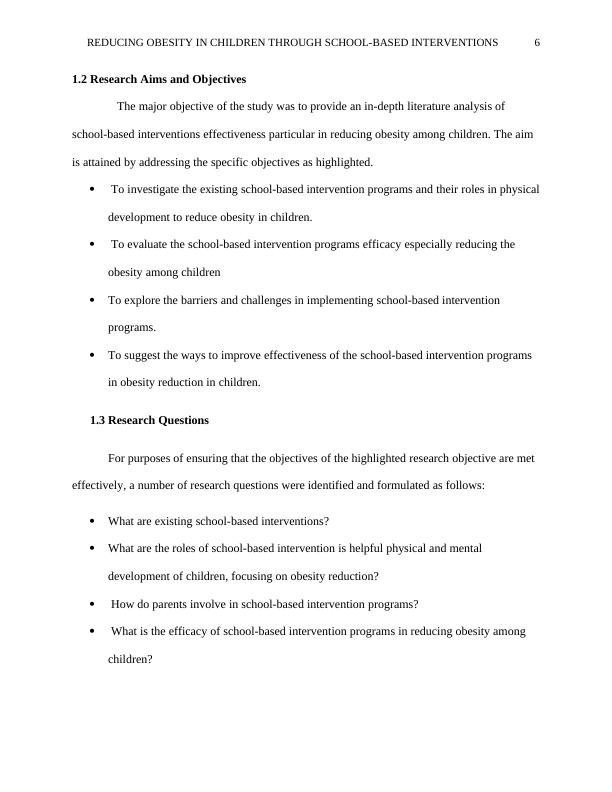
REDUCING OBESITY IN CHILDREN THROUGH SCHOOL-BASED INTERVENTIONS 7
What are the barriers and challenges in establishing and conducting school-based
intervention programs?
What are strategies to improve the school-based intervention programs effectiveness in
reducing obesity occurrence in children?
1.4 Research Rationale
The major rationales of conducting this systematic review are inconsistent and varied
school-based intervention programs’ effectiveness in schools from previous studies. It is worth
noting that Balle and Tortella (2010) argue that the inconsistent and varied settings of school-
based intervention are making barriers in physical and mental development of children. In
addition, the lack of studies about the barriers and challenges in implementing the school-based
programs is also a big rational of this systematic review thereby providing room for further
study. Furthermore, this systematic review analyse the challenges and barriers in implementation
of school-based programs and achieve solution for the same. Moreover, a review by Verjans et
al. (2018), attempt to look at the nutritional behaviour that leads to obesity. However, limited
research has been carried out on nutritional behaviour specifically in school-based intervention
programme. Besides, the result regarding nutritional behaviour on school going children were
inconclusive according to research conducted by Verjans, et al. (2018) and Mahmood, et al.,
(2014). It therefore, provides a gap to carry out the objective of this research study which seeks
to assess the effectiveness of school-based intervention programs in reducing occurrence of
obesity among children.
What are the barriers and challenges in establishing and conducting school-based
intervention programs?
What are strategies to improve the school-based intervention programs effectiveness in
reducing obesity occurrence in children?
1.4 Research Rationale
The major rationales of conducting this systematic review are inconsistent and varied
school-based intervention programs’ effectiveness in schools from previous studies. It is worth
noting that Balle and Tortella (2010) argue that the inconsistent and varied settings of school-
based intervention are making barriers in physical and mental development of children. In
addition, the lack of studies about the barriers and challenges in implementing the school-based
programs is also a big rational of this systematic review thereby providing room for further
study. Furthermore, this systematic review analyse the challenges and barriers in implementation
of school-based programs and achieve solution for the same. Moreover, a review by Verjans et
al. (2018), attempt to look at the nutritional behaviour that leads to obesity. However, limited
research has been carried out on nutritional behaviour specifically in school-based intervention
programme. Besides, the result regarding nutritional behaviour on school going children were
inconclusive according to research conducted by Verjans, et al. (2018) and Mahmood, et al.,
(2014). It therefore, provides a gap to carry out the objective of this research study which seeks
to assess the effectiveness of school-based intervention programs in reducing occurrence of
obesity among children.
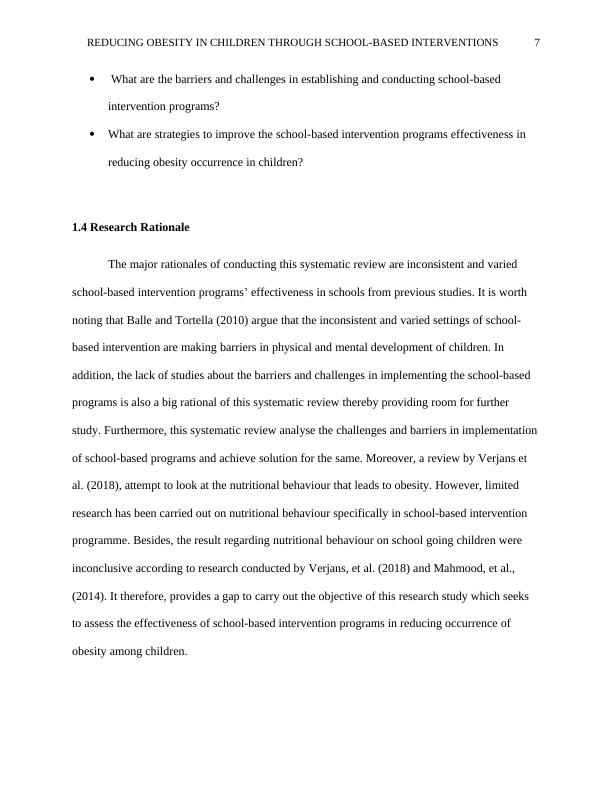
REDUCING OBESITY IN CHILDREN THROUGH SCHOOL-BASED INTERVENTIONS 8
CHAPTER TWO: BACKGROUND
Chapter two of the review explores in-depth background of the literature review of the
past research works on children obesity. This chapter background begins with effective
introduction where the obesity is defined. The section provides the causes of obesity in children
which broadly classified as environmental factors, sedentary lifestyle, psychological factors,
socio-cultural factors, family factors as well as dietary factors. Furthermore, the chapter
discusses the impacts of obesity on children. Moreover, the chapter also discusses the
interventions strategies that assist in reducing as well controlling obesity in children. The
interventions are broadly categorized as governmental interventions, family-based interventions,
and school-based interventions.
3.1 Introduction
Today, the world is considered to have undergone not only a rapid nutritional
transformation but also a speedy epidemiological evolution characterized by unrelenting
deficiencies associated with nutrition. The nutritional deficiencies are evidenced by anemia, zinc,
stunting, and iron deficiencies’ prevalence. On the other hand, there is a worrying rise in
diabetes, obesity and other associated chronic diseases like some types of cancer, cardiovascular
disease. It is worth noting that, the progressive increase in obesity is considered to have reached
plague levels especially in some developed countries. Although the highest childhood rates has
been observed in different developed countries like the US, Australia, Germany, France and
Italy; the prevalence is growingly increasing as well in developing countries. Furthermore, Sahoo
et al. (2015) shows that as result of intrinsic hormonal differences, females are affected by
obesity as compared to males.
CHAPTER TWO: BACKGROUND
Chapter two of the review explores in-depth background of the literature review of the
past research works on children obesity. This chapter background begins with effective
introduction where the obesity is defined. The section provides the causes of obesity in children
which broadly classified as environmental factors, sedentary lifestyle, psychological factors,
socio-cultural factors, family factors as well as dietary factors. Furthermore, the chapter
discusses the impacts of obesity on children. Moreover, the chapter also discusses the
interventions strategies that assist in reducing as well controlling obesity in children. The
interventions are broadly categorized as governmental interventions, family-based interventions,
and school-based interventions.
3.1 Introduction
Today, the world is considered to have undergone not only a rapid nutritional
transformation but also a speedy epidemiological evolution characterized by unrelenting
deficiencies associated with nutrition. The nutritional deficiencies are evidenced by anemia, zinc,
stunting, and iron deficiencies’ prevalence. On the other hand, there is a worrying rise in
diabetes, obesity and other associated chronic diseases like some types of cancer, cardiovascular
disease. It is worth noting that, the progressive increase in obesity is considered to have reached
plague levels especially in some developed countries. Although the highest childhood rates has
been observed in different developed countries like the US, Australia, Germany, France and
Italy; the prevalence is growingly increasing as well in developing countries. Furthermore, Sahoo
et al. (2015) shows that as result of intrinsic hormonal differences, females are affected by
obesity as compared to males.
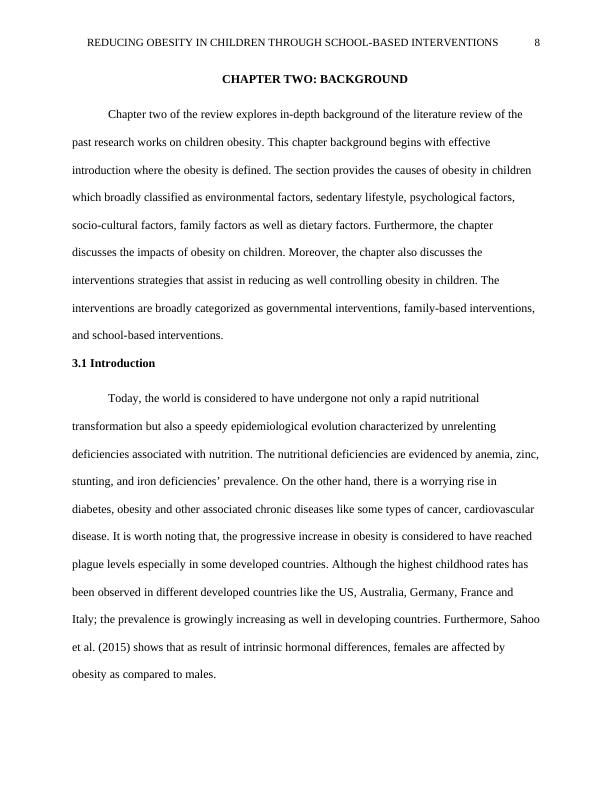
End of preview
Want to access all the pages? Upload your documents or become a member.
Related Documents
Assignment on Effectiveness of School-based Interventions to Preventlg...
|55
|12765
|17
Systematic Review on Efficacy of School-based Intervention Programs in Reducing Obesity among School Childrenlg...
|11
|3046
|105
Promoting Nutrition in Schools: Evidence-Based Strategies and Program Planlg...
|12
|3016
|256
Role of Nurse in Childhood Obesity Preventionlg...
|38
|9864
|417
Impact of Diet on Health and Weight Reductionlg...
|49
|15264
|25
Assignment on Childhood Obesitylg...
|7
|1492
|148
